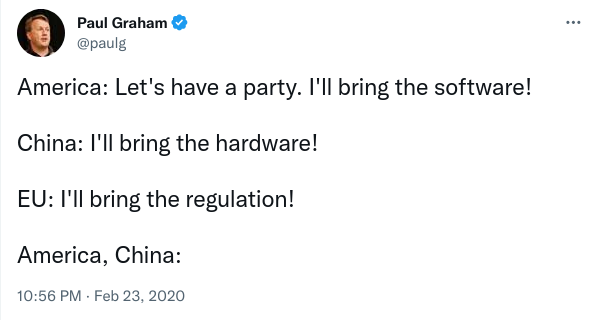Is Europe Just Not Good at Innovating?
This article is part of a series on (European) innovation and capabilities. Feedback is very welcome on bert@hubertnet.nl. I’d also like to thank the many proofreaders, but all mistakes remain mine!
In the world of (high) technology, Europe is exceptionally weak at innovating. There are many ways to explain how this came to be, and a lot of the discussion focuses on unfair business conditions and regulation. In this post however I want to talk about important cultural and social reasons that are at least part of the reason, and present some possible solutions.

Photo by Christian Lue on Unsplash
In short, it could also be said that Europe should not whine, and the reason our (software) innovation is so dire is simply because we do not value technology or innovation, and are no longer particularly good at it. In addition, we might simply lack the ambition to take risks to create new things.
And (With Some Notable Exceptions) there is quite a lot of truth to that.
Now, Europe spends a lot of time talking about regulation and how to stimulate innovation. But as long as we are not honest about all reasons why we are not competitive, this is not going to help. And in fact, some people still need convincing we aren’t very competitive anymore.

This article attempts to highlight some unsavory truths on Europe’s recent lack of innovative success, and to show how the instruments to improve things are not adequate.
But do read this post together with the rest of the series on (European) innovation and capabilities! Also, I am aware some really cool innovation is still happening in Europe (DuckDB for example). But it is not enough, hence this article.
The situation
We get our communications and business platforms almost exclusively from the US. Meanwhile, we source the hardware from China. If this hardware needs to be operated, we tend to outsource this to the lowest bidder, again almost exclusively delivered from outside of Europe.
If we look at innovation, for example in AI, again, Europe barely even has a presence. And what we still have is often leaving.
In previous articles I have discussed this at length, and also wrote a lot of words on structural business reasons. In short, in Europe, we’ve outlawed surveillance capitalism, and we mostly uphold this for our own companies. Meanwhile, US companies continue to operate business models here that rely on us handing over our data, and we are generally letting this happen, despite being the “regulation continent”. For patents, the reverse holds – we have a very hard time operating in the US because of IPR minefields surrounding any software innovation, which is far less of a thing in Europe (for now).

It should be noted that the US has its own regulation problems
Our communication companies meanwhile have lost interest in doing anything technical, so they’ve had no qualms about outsourcing everything. Other companies similarly now focus on their brand, and let technology lose out.
That our current enterprises are not very innovative is a big problem in itself, but it is not a particularly European problem. A more unique problem here is that we’ve comparably seen very little innovation coming from academia or startups. Maybe we are just weak, have no skills and lack ambition?
In this piece, I’m assuming that large staid corporations are unlikely to come up with really new things. That does not however mean that such corporations are useless – inventions which require large well funded organizations to execute can’t be bootstrapped by startups. And in fact, European large companies aren’t doing too badly.
Airbus still makes very good airplanes, ASML makes the best wafer steppers, Volkswagen AG cranks out credible electrical vehicles (I drive one) and there are many more companies that are innovating incrementally. In addition, our scientific institutes are still among the world’s best in fundamental research. But on this page the focus is on how Europe has problems doing truly new things quickly.
In what follows I identify a few cultural and social aspects:
- In the US, for a variety of dystopian reasons the expectation value of launching/joining an innovative (startup) organization is relatively speaking far better than taking a normal job. In Europe a less exciting job offers a pretty good expectation value, whereas a startup might ruin you, and gets you into mortgage and tax problems.
- For similar reasons, innovative founders will far more often continue to innovate in the US. Unlike in Europe, landing it big one time is often not enough to retire safely in the US.
- Talented people have a choice of careers. In Europe we steadfastly underpay technologists. Many people that really really want to get into engineering and programming continue to do so anyhow. A larger class however gets swayed by better paying jobs in financial engineering and other non-productive shenanigans. The response here to far higher US salaries for technical people is always that money is not the only factor. This is true. However, the OTHER factor of work is being appreciated and valued, and we also do not offer that! In Europe we outsource technology, as we don’t really consider it a core activity.
- Not only do we not appreciate technologists, we also penalize founders. Banks, tax agencies and even family members distrust startups and will make life difficult for you.
- Europe is not an attractive destination for ambitious immigrants, we do not have major companies with immigrant CEOs (compare Microsoft and Google).
- For better or worse, here in Europe we are fond of business plans that somehow make sense. Blue sky “let’s launch this and I’m sure we’ll eventually find sufficient rent seeking or surveillance possibilities to one day make money” things don’t fly too well here.
- Specifically, I’ve found that in the US it is quite acceptable to discuss plans that revolve around eventually screwing over your customers when they aren’t in a position to leave
- In addition, European investors and entrepreneurs don’t tend to see their ventures as ’lottery tickets’ that might pay off. We like to see things costed with at least a theoretical path to profits
- Related, it really is the case that (on average) US entrepreneurs are more ruthless, ambitious and competitive than European ones. The flip side of this is that any nastiness hinders trust which makes it harder to build partnerships.
Given the above it is clear that strategies to promote innovation need to be tailored to the European landscape. It is not the case that simply adding funding to Europeans will deliver American results.
A complete strategy will involve at least:
- Taking measures to de-risk innovative spinoffs and startups. Founders should not face mortgage discrimination, governments should not haunt founders for alleged tax crimes over paper valuations of their enterprises.
- Clarify that making money is not somehow dirty. Government should do business with startups and not be frugal. If you can spend 10 billion euros on a late satellite program, you can spend real money (tens of millions) on startups building things for you too.
- Calibrate funding plans so that they take actual risks. So do not hand out subsidies that are guaranteed to get a specific deliverable. If a government is an at-risk funder of an initiative, others will follow. This is not ‘Horizon Europe’, by the way, although it is a valuable effort.
- Getting universities and institutes to actually let go of the fruits of their research instead of tying down startups/spinouts with onerous rules.
- Recognizing we will never be as ruthless as US companies (on average), do leverage our cooperative streak. We love working together. Fund innovative ecosystems, not just companies. As a government, be more than a funder, but actually orchestrate such ecosystems by being part of them by providing data, customers, opportunities, facilities and where applicable, legal frameworks that make it less risky to cooperate.
Comparing the US and Europe expectation values
This section will likely upset readers on both sides of the Atlantic. I do want to say that in this piece I am focusing more on ‘Old Europe’ as Donald Rumsfeld once called it. “New Europe”, the post-communist countries, appears to be doing a lot better.
Here in Old Europe, it is true that we are pretty complacent. When I launched my first startup I was 24, and friends and family were worried about what this would mean for my pension (we still have those here!). I kid you not. For lots of people, especially the higher educated ones, life here is pretty comfortable. There are lots of safe and steady ways to make a living. A friend of mine recently launched her startup and yet again family worried about her pension.
Although I think people tend to overestimate the safety of a corporate job, it remains something you could always do and make a reasonable living. The expectation value of going for the steady job is pretty good: decent money, pension fund, nice office. Meanwhile, doing an actually innovative startup is full of risks. You might go bankrupt, and while you are doing it, you’ll struggle to get a mortgage since banks here don’t like startups. When I was on my second company, my employees could get a mortgage, but as a founder I could not.
Should your startup go bankrupt, chances are you will as well, and you’ll have to live under a multi-year purgatory during which time your innovative abilities are severely curtailed. No bank will touch you also. It really is pretty bad.
Innovation does not only come from first time entrepreneurs. In fact, in terms of volume, if we look internationally, lots of new things have come from teams full of people on their third or fourth company. Notably, a lot of these folks are pretty ’loaded’ already financially.
Here in Europe, entrepreneurs that successfully launched one company often then go on to do only vanity projects. It is a lot of fun being an advisor. It is pretty rare here for someone to then take what they learned and to practically go on innovating. Once you’ve done your first company, the incentive is sort of gone.
We are thus in a climate where many people have no real incentive to start their first company, let alone go on to do a second or third one.
This is a strong counterpoint to the narrative that Europe could solve it problems by laying off the GDPR and other regulation. There are differences far beyond regulation.
The US
It may be good to realize how much of a dystopia the US has become already. Most well-educated Americans leave college under Absolutely Crushing Debt. And this is no ordinary debt – it survives bankruptcy!
In addition to this crushing debt, Americans know they are one badly timed medical incident away from losing it all. In theory you might have insurance, but while unconscious you might still ‘pick’ an out-of-network hospital or anesthesiologist and end up with huge bills. If you know the right people and can afford it, you could then negotiate this down. Maybe. I know several smart Americans that had to live from their car while they sorted out financial issues.
Compared to Europe, the expectation value of a boring corporate job in the US is not great. You might never earn enough to repay your student loans, even if your household manages to avoid scary medical escapades.
Although doing/joining a startup is still fraught with risk, that risk was there anyhow. And in fact, the expectation value of doing a startup is probably better – at least there is significant upside! It might be the only way to get rid of student and medical debt. Joining or launching an innovative startup may be a way in the US to reduce your risk (!).

US startup employees dreaming about getting out of student debt - Photo by Austin Distel on Unsplash, useproof.com
Even a single successful startup however may not be enough to gain security. Being a millionaire in the US still does not give you the security of a well paying European corporate job. Being relatively rich does not deliver US health insurance that won’t wipe you out if you are unlucky. I know several very well off Americans that hold down a boring corporate job mostly for healthcare reasons.
More excitingly, in the US many first time founders go on for second and third company launches, where they benefit massively from what they learned earlier. This is the source of much maturer and more rapidly scaling startups.
In the US it is common to pay important employees large amounts of money, which is fine as long as they are also making a lot of money for the company. A programmer that saves 10% of hardware cost could justifiably get a 100k bonus. They probably saved a lot more than that. Technical people do have the power to contribute that much to the bottom line, and it is a great reason to get into tech. In this way, picking technology as a career is quite attractive, so it happens more in the US.
Europe
In Europe we tend to be much more egalitarian. This is nice since lots of people hold steady jobs with decent pay. If you do really well you might get a bonus. For instance, I once saved my employer millions and I got a 1000 euro bonus, which was delivered with great fanfare and a formal letter of congratulations. There was much rejoicing.
While on average this is all great, specifically technical and scientific people come out very badly this way. Employers want to pay the people that actually invent technology in about the same way as we pay the people that maintain our elevators and airconditioners: “technology people”, or perhaps even “maintenance people”.
Meanwhile, we hand over huge sums to financial wizards, high frequency traders and other people that somehow contribute to revenues without making or inventing anything.
This is not just about money though – technology tends to get seen as something you buy, not something you do. We don’t appreciate researchers or inventors or technical skills in general. In European companies it is extremely common that most of the technical staff are actually agents, people rented from an outsourcer or other “body shops”. This serves two reasons. For one, much like we don’t employ our own cleaners, we’re not comfortable hiring actual people that make things. Secondly, we’ve found that given the salaries that we pay for technical talent, no one wants to join our companies. So instead of raising wages, we rent the technical people through third parties, where conditions are better for employees.
This has led to quite decent salaries for people hired that way. But the huge downside of all these rented people is that they don’t have a real stake in the place where they do their work. If they think up something cool, they’ll take it with them when they leave. Conversely, companies also feel no need to invest in such rented bodies.
And in fact they don’t – remote working has made it possible to hire services from whole continents away. Such outsourcing now means that most large European companies don’t actually run themselves. As long as this works, the lights do stay on. But you’re never going to invent anything.
Meanwhile, people doing startups are admired, but also considered somewhat nuts. Think about your pension! Our banks don’t like startup founders and neither do many of our tax agencies, who often consider paper wealth to be real wealth. While they consider the paper wealth to be real, the tax agencies want to get paid with actual cash. This kills many plans – your company isn’t ready to be sold (or you don’t want to sell it) but you already owe the government a ton of actual cash!
A bit on marketing and product development
Readers of this article might get the impression that technology is all that matters. Now, I do deeply believe that for fundamental progress, we need the best technology. But that technology does not become popular or useful by itself.
An interesting issue is that European people tend to dislike over the top American marketing (‘Solves 100% of problems even before you know about them!’). Our own efforts tend to be rather bland (‘Solves some problems pretty well’). Even just accurately stating that the service is good feels like bragging to many of us. Americans meanwhile are calibrated to take 50% off the top of their own marketing, which sort of gets you to a reasonably accurate result.
However, they’ll also take 50% off the top of bland European marketing, which leads to rather mediocre conclusions (‘Barely solves one problem’).

Rest of Europe is somewhere in between
Meanwhile here in Europe, we may dislike over the top marketing from US vendors, but we still somehow believe it. I’ve experienced this myself when I had to endlessly prove to my European customers that my software could actually do what we claimed. Meanwhile our American competition could just do PowerPoint presentations with provably fabulated claims in there and land sales.
Similarly, Chinese companies can get away with operating and maintaining vital European national infrastructure because we trust their promises that they won’t be cooperating with the Chinese government, even though their pricing is not realistic, suggesting an ulterior motive. This kills our own companies that make similar solutions.
There’s a saying in Dutch: “A good product sells itself”. And we actually believe that! Even though it is only true once you are massively successful. Imagine sitting behind a desk with a great product and waiting for people to spontaneously come to you to buy it. It is not going to happen.
If we continue to tell people that good products will sell themselves, we’ll massively underinvest in getting to know what customers actually want/need, and what is holding them back from buying our stuff. It is frankly embarrassing how often you need to tell European entrepreneurs that they should engage with their (potential) customer base and actively flog their product or service!
Marketing, sales and product development are not dirty words. I’m not saying Europeans should start doing over the top marketing and frantic growth hacking. But we should realize that world markets worry that if you yourself are not even doing a great job promoting your stuff, that it might not be very good.
And we should definitely stop believing non-European (over the top) claims while mistrusting our own!
Immigration
This section is new after it was pointed out I had missed out on this vital aspect. And that I did miss out is telling in itself. Here in Europe, we rely on immigration for cheaper workers or to do work we no longer want to do. This is not unlike the US. But we’ve not managed to become a good destination for talent wanting to make it big. A notable exception is BioNTech which was founded by Uğur Şahin and Özlem Türeci who developed one of the major SARS-CoV-2 vaccines.
The path to entrepreneurial success as a first or second generation immigrant is probably far more difficult here in Europe than in the US. From a reader “To paraphrase Reagan; you can spend a lifetime in Italy but you will never be an Italian (or German or French or Swedish or …Japanese). But anyone can be an American — and be truly so.”. Now, this success in the US does not appear to be evenly distributed (try to avoid traffic stops while Black, for example), but take a look at say Google and Microsoft leadership and then look at most European companies and the difference is stark. The UK does a bit better than the rest of Europe.
In other work, I’ve looked at PyTorch, one of the most important pieces of software in the deep learning revolution. It powers ChatGPT. PyTorch is developed by Meta and a few other American companies. Of the top-10 authors of PyTorch, 5 have Chinese last names, 2 Indian, 1 Russian and one Polish one. For one name I’m not sure, but it is clear PyTorch was able to benefit from the work of people hailing from around the world.
Europe clearly has work to do here.
European (investor) culture
European investor culture is incomparable to the culture in the US, to the point that most investments in European innovation actually come from the US (!). We just don’t really feel like it. Now, this is a problem coming from two sides. European investors are a lot more traditional and would like to invest in solid business plans. The problem with innovation is that often you don’t have such a solid plan. From personal experience as a potential investor, innovative small companies here also often don’t even attempt to come up with a semi-plausible plan.
In the US there is the strongly held belief (often correct) that if you have great technology, eventually you’ll find a way to monetize it. Perhaps by selling all your user data, or perhaps by squeezing the customers that have come to rely on your previously cheap product.
Here in Europe we often lack such imagination, or even the will. I’ve been in discussions on both sides of the ocean on business plans that involve possibly extorting customers that have no place to go. I’m not saying we’d never do this in Europe, but it is not something you discuss in the open. It is perhaps implied that we might eventually have to resort to squeezing customers. In the US however, these discussions are held frankly and also quite early in the life of a company. Conversely, US customers also expect to be shafted eventually. Both Europe and the US have probably not found the right balance on this front.
The problem however is that Europe’s chosen balance means we like to see costed plans with traditional ways of making money in there.
And that is just not how you innovate. The US typically allows itself to start inventing new things based on the faith that it will somehow eventually make money.
In addition, for reasons no one can fathom, US investment rounds tend to be five times larger than European ones, for similar ventures. The European market is not smaller than the US market, so it is not quite clear why this happens. But it doesn’t help.
Attempted solutions
For the past 20 years at least European governments and agencies have been making pilgrimages to Silicon Valley in hopes of learning how to ignite our own ‘Silicon Glens’ or equivalents. While there is much to admire (and hate) about the Bay Area, you can’t bring some parts of the culture there to Europe and expect it to work. Because it doesn’t.

Tim Cook meeting two European politicians
European innovation is held back by (investor) culture, tax problems, unevenly applied regulation and complacency. Addressing any of these things individually is not going to help that much.
And frankly, even changing many things so we are more American (or Chinese perhaps) won’t work simply because fundamentally we are wired differently here in terms of values and entrepreneurial approaches.
A real solution therefore needs to be geared towards adoption by Europeans. But we must also learn how to do things differently than how we are doing them now.
Europe has traditionally attempted to foster innovation via the rituals of handing out oodles of research funding (like Horizon Europe, but there are also vast national programs) and doing public procurement. The last is an exceptionally ridiculous way of innovating, but that’s what we do.
Also, research institutes are stimulated (in theory) to ‘valorize’ their discoveries. The idea there is that universities and institutes should allow companies to commercialize the government funded intellectual property. In practice this does not work at all for many places - institutes want risk free solutions where the spun out company/startup can be forced to hand back any patents and licenses the moment things don’t appear to go too well. But there is no risk free innovation, and lots of research therefore stays on the shelf of institutes here.
US and American funding
Briefly, the US model goes like this. You have a cool idea and this generates some seed funding. Once it is looking like it could turn into something, a ritual starts where an ‘A-round’ is held. This is a battle between investors and founders, but where everyone knows that they are in it to become very rich (or much richer). This is also where you can talk about how you’ll start out by giving away your technology/services, and outline how eventually you are going to squeeze everyone to make truly big money, or alternatively, how you’ll pivot to some even grander promise down the road. By doing that, you can either start making money or credibly predict that you’ll be making even MORE money in the future (just not now).
There follow more funding rounds, or one of the really big players picks you up because they can use the technology on their customer base and reap the benefits.
But for a large amount of time, there is no realistic hope of making money, let alone ethically. Still, and I admire this, the company plows on.
Now, if you try to replicate this in Europe, you’ll already fail to pick up seed capital. Investors here get approached a lot by founders that can’t quite articulate what they are doing nor how it’ll ever turn into a bona fide business. We then decline to invest, and mock these founders for not having their act together. Even if you get beyond this point, the European market for ‘A-rounds’ etc is not very liquid. Lots of talking and not a lot happens, especially if are truly doing something new. Eventually American investors step in, and from that point on things follow the US template, and a few years down the road your company may disappear into the black hole that is Apple.
Meanwhile, we’re trying to counter this with rituals of our own: subsidies and grants. The EU and its member states all hand out billions upon billions for very worthy goals. The ticket to entry however is filling out stacks of forms and papers and tying down the future of your company to concrete goals. If you don’t meet these specific goals, the government wants its money back. You can’t meaningfully pivot! Pivot is not in the dictionary of European government funders. This actually happened to me, by the way, and it was not pretty.

Photo by Wesley Tingey on Unsplash
The other problem is that you likely won’t get that money. The rituals to get this kind of funding are so difficult that there are places that are very good at it, and they win a lot of the money. The issue is that these places may be good at filling out forms, but they are themselves not very innovative. Governments however like working with these professionals as they are very good at ticking all the boxes.
As a case in point, the EU recently created funding for quantum communications. One of the requirements for getting any funding is being able to hand over 3 continuous years of good financial figures. No startup can do this. But large boring enterprises can. These then likely also go through the motions of the submitted program, but it is unlikely they’ll invent anything cool along the way.
Another way in which Europe tries to get things done is by outlining goals, for example the pretty lofty ideals of REPowerEU under which HUNDREDS OF BILLIONS of euros are available to rid ourselves of our Russian energy dependency. Or, the CHIPS Act , another 43 billion euros to support a local semiconductor industry. But again, the way the money is handed out is fully controlled - no euro must be wasted. And this is indeed a worthy goal, but it does not get you any at-risk innovation.
What could be done?
Quite a lot of the above is about cultural aspects. And you can’t solve those quickly, although the time to start is now. Some more appreciation for technology, innovation and risk taking would be very welcome. But in the short term, we can’t expect meaningful change there.
Europe does have a few things going for it though. For one, we educate stupendous amounts of people to the highest levels of knowledge (and then we sit them behind an Excel sheet). If we want to do innovative things, the raw brainpower is there in spades. We can also see this since a lot of US innovation is in fact powered by European (and other) emigrants. It is also quite tempting to go to the US since they pay twice as much in real terms and, since the financing is better, growth is much faster.

We also (for now) have sufficient money, if only we spent it on actual innovation.
In Germany my friends over at the Federal agency for disruptive innovation (SPRIND) are exploring new ways of giving innovators money without tying them down. To gain access to SPRIND funding, there is a one page form. I wish we had many more agencies for disruptive innovation in Europe.
We also have lots of interesting problems that need to be solved quickly (like climate change, energy dependency, our eventually unaffordable healthcare, fake news/misinformation, our utter dependence on China, weak defenses etc), so that is also good news.
And perhaps we could turn a few of our “weaknesses” into strengths: less ruthless but more cooperative business culture, more realistic and less surveillance driven investor appetite, ample technical talent we’re currently not making good use of.
Instead of lamenting we are not like Silicon Valley, we might celebrate that we aren’t. The converse of ruthless and highly ambitious entrepreneurs is a lack of trust - if everyone is waiting to stab each other in the back you won’t form standards and cooperative bodies.
As a case in point, US banks make it very hard to transfer money from one bank to another, imposing average costs of $26 plus a lot of hassle. Instead, third parties have cropped up to make this easy. But sadly, these are all heavy on surveillance and selling your data. Meanwhile, all banks part of the Single Euro Payments Area, which includes non-euro banks, offer seamless, fast and cheap/free wire transfers.
Renewable energy will not be delivered by any single organization - it needs a whole ecosystem for all kinds of aspects like storage, transport, trade, conversion, accounting, charging etc. Europe’s instincts are well geared towards setting up cooperations and communities to make this happen.
Instead of also trying to do a Facebook, why not build something that serves the legitimate need for communities to exchange information, without selling all their data in the process? Or how about a microblog social media service that does not have one central body that decides what fascism is (or if it is ok).
Development of new (classes of) antibiotics is absolutely crucial, but there is no business model for new first line treatments, as these compete with generics. Europe should be able to drive innovation even in the absence of huge future profits, so why not do it?
While the US has a dire absolute shortage of technical talent, we have a surplus of idle technologists that would love to program and make things if only someone asked them to do innovative things. Instead we have tons of highly educated folks doing Excel work or building complex financial constructs.
Meanwhile we have huge public procurement circuses going on where our governments spend billions on advanced solutions from outside of Europe. We’d love to make our companies more innovative, but it is hard to force them. However, our governments procure a stunning amount of technology. It is popular to hate on public procurement legislation but this is mostly not fair. It is entirely possible to tender projects in such a way that non-dominant players stand an actual chance. It is even possible to demand a European solution, or to create requirements that make it very hard for surveillance-capitalist suppliers to deliver a compliant bid. It just requires some guts and decent knowledge of procurement law.
We could create a vibrant economy for European products and services if only our own governments would step in to do business with these (as yet) non-dominant players. Because if you have (say) the French healthcare system as a satisfied customer, you barely need a sales pitch anymore beyond that single fact.
Summarizing
Europe’s lack of innovative high-tech success is often blamed on our penchant for regulation but there are many cultural aspects as well. This has been recognized and attempts have been made to make the European tech scene more like Silicon Valley, but it has not worked and it is not going to work – there are far deeper reasons why we innovate so slowly.
This article has highlighted the stark differences between the US and Europe, and why innovating in the US is a way for an individual to reduce their risks and improve their outlook. Meanwhile in Europe, a non-innovative job offers the best expectation value. Plus there are our old fashioned expectations of well costed innovation plans where we know up front how we’re going to make money.
We should recognize this and find other ways to fund innovation. Our traditional medicines to foster innovation (subsidies and procurement) aren’t doing the job. Or as EU Commissioner Vestager noted recently, you can’t build competitiveness out of subsidies.
However, if we change our goals to more European ones, and if we bootstrap a local innovative market, things may start improving again.
Some parting thoughts
Multiple (proof)readers have wondered why I don’t address Chinese, Asian or other innovation styles. Of course I’d love to, but almost everything on this page is backed by personal experience, and I have (almost) no experience outside Europe and the US. I can however recommend:
Both by bunnie from bunnie:studios. These two pages left me stunned at how our own “western” style of innovation is ready for the museum.
There are also substantial intellectual property issues that hinder anyone trying to do business in the US, but are no problem for US companies doing business in Europe, perhaps the subject of a future article.
Finally, I’d like to remind readers that this perhaps uncomfortable page is part of a whole series of posts on (European) innovation and capabilities. There are many other aspects to our problems as well, including regulation.
